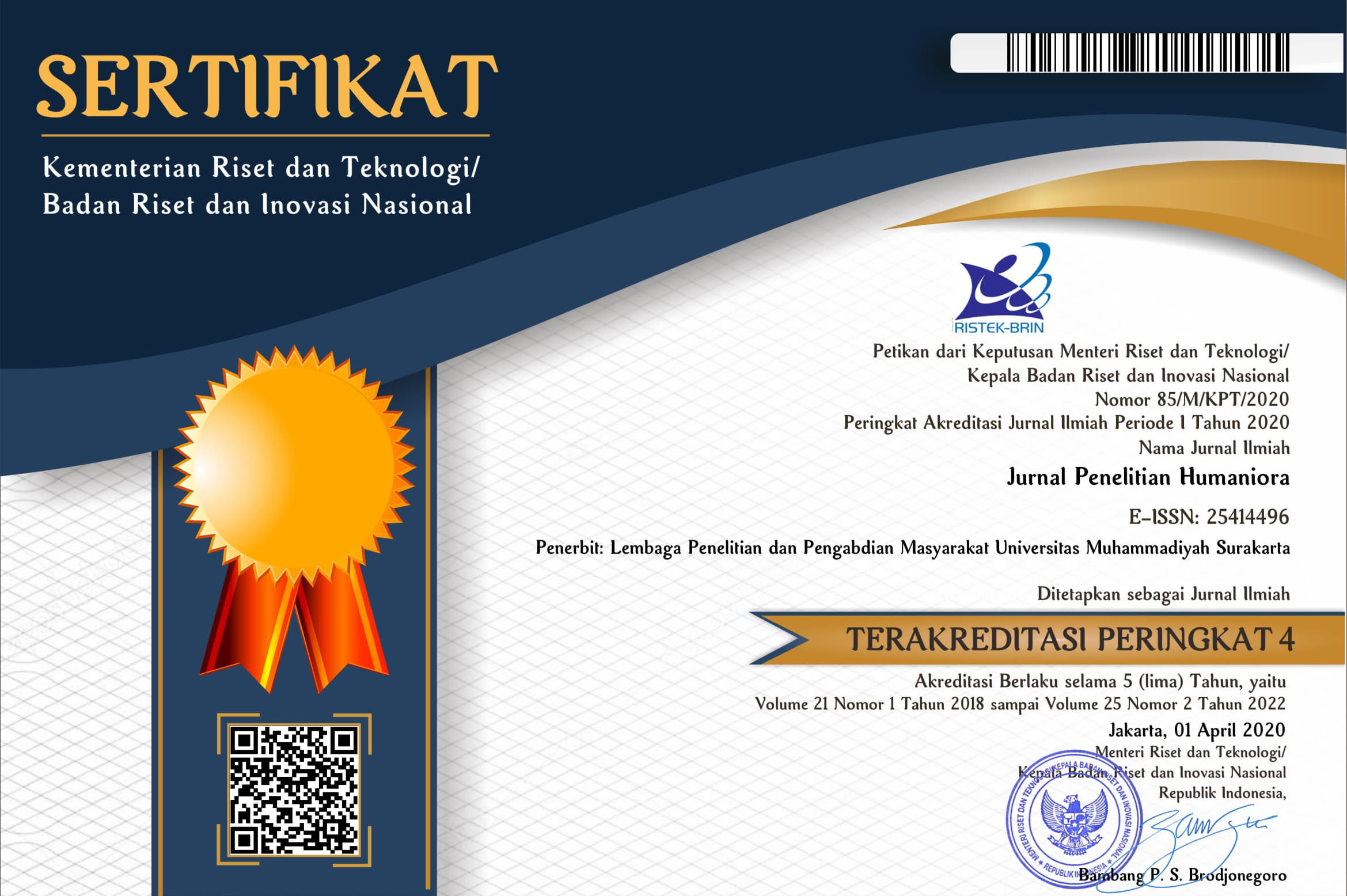FROM FAIRY TALES TO ACTION ADVENTURE MOVIE: THE MAINTENANCE OF WOMEN AS VICTIM OF VIOLENCE IN THE MOVIE SNOW WHITE AND THE HUNTSMAN (2012)
Restu Dedy Hendriyanto(1*), Yusuf Kurniawan(2)(1) Universitas Sebelas Maret
(2) Universitas Sebelas Maret
(*) Corresponding Author
Abstract
Keywords
Full Text:
PDFReferences
Bampatzimopoulos, S. (2015). Female action hero vs male dominance. Üniversitesi Dil ve Tarih-Coğrafya, 55(2), 205-218.
Braley, M. (2001). World war II allied women’s services. Oxford: Osprey Publishing.
Barker, C. (2003). Cultural studies theory and practices (Second Edition). New Delhi: SAGE Publications.
Barthes, R. (1991). Mythologies. Paris: The Noonday Press.
Biography (2018). Hillary Clinton Biography. Biography.com. Retrieved May 7th, 2018 from https://www.biography.com/people/hillary-clinton-9251306
Biography. (2018). Sarah Huckabee Sanders. Biography.com. Retrieved September 23rd,2018 from https://www.biography.com/people/sarah-huckabee-sanders
Boddu, A. S. (2015). Revenge, masculinity and glorification of violence in the godfather. International Journal of Social Science and Humanities Research, 3(2), 6-12.
Bogarosh, N. A. (2013). The Princess, the Damsel, and the Sidekick: Women as the "other" in popular films (2000-2011). Washington: Washington State University.
Bordwell, D, & Thompson, K. (2008). Film art: An introduction. New York: McGraw-Hill.
Campbell, N, &Kein, A. (1997). American cultural studies: An introduction to American culture. London: Routledge.
Davaki, K. (2012). Gender equality policies in the USA. Available at https://www.google.co.id/url?sa=t&rct=j&q=&esrc=s&source=web&cd=1&ved=2ahUKEwi4_NzRsv3mAhVNbn0KHZ-kCL0QFjAAegQIAhAC&url=https%3A%2F%2Fwww.europarl.europa.eu%2FRegData%2Fetudes%2Fnote%2Fjoin%2F2012%2F462439%2FIPOL-FEMM_NT(2012)462439_EN.pdf&usg=AOvVaw1P0Vfu5gCuOAa__SVkbd27
Davis, A. M. (2001). Disney's women: Changes in depictions of femininity in Walt Disney's animated feature films, 1937-1999. London: University of London.
Dijk, T. A. V. (1998). News as discourse. London: Lawrence Erlbaum Associates, Inc.
Dijk, T. A. V. (2006). Ideology and discourse analysis. Routledge, 11(2), 116-117.
Dutt, R. (2014). Behind the curtain: Women's representations in contemporar Hollywoodod. Media@LSE.
Dworkin, A. (1974). Women hating. New York: Penguin Group.
Edman, T. B. (2015). Power in jeopardy: A poststructuralist reading of the Arthurian legend from Malory’s Le Morted’Arthur and Tennyson’s Idylls of the King to Tolkien’s The Lord of the Rings. Journal of History Culture and Art Research, 4(2), 88DOIoi:10.7596/taksad.v4i2.436.
England, D. E., Descartes, L., & Collier-Meek, M. A. (2011). Gender role portrayal and the Disney princesses. Springer Science+Business Media, 64, 555–567.
Fredericks, M. (2009). Media portrayal of gender stereotypes in the 1950s: Walt Disney‘s Cinderella and Sleeping Beauty. Wisconsin: University of Wisconsin Eau Claire.
Gauntlett, D. (2008). Media, gender and identity: An introduction. New York: Routledge.
Google image. Retrieved 17th April, 2018, from http://lh3.ggpht.com/-NADLR-fYLZc/USCTL1m7KLI/AAAAAAAAGSE/09use8NBsKI/History-of-the-Washing-Machine-5%25255B4%25255D.jpg?imgmax=800
Goodwill, J.-A. S. (2009). The action hero revisioned: An analysis of female “masculinity” in the new female hero in recent filmic texts (Dissertation). University of South Africa. Available at https://www.google.co.id/url?sa=t&rct=j&q=&esrc=s&source=web&cd=1&ved=2ahUKEwjnj6Gus_3mAhVSWysKHRaEDYoQFjAAegQIBhAC&url=http%3A%2F%2Fuir.unisa.ac.za%2Fbitstream%2Fhandle%2F10500%2F2641%2Fdissertation_goodwill_%2520j.pdf%3Fsequence%3D1%26isAllowed%3Dy&usg=AOvVaw3MA8KcgL01z1cuRzd_XaiN
Greatist (2013). 20 Standout Groups Stopping Domestic Violence. Greatist.com. Retrieved 4thOktober, 2018, from https://greatist.com/happiness/stop-domestic-violence-prganizations
Halberstam, J. (1998). Female masculinity. Duke: Duke University Press.
Heiderich, T. (2012). The different type of shots. Ontario Mining Association. Retrieved 6th June, 2018 from https://www.oma.on.ca/en/contestpages/resources/free-report-cinematography.pdf
Holmer, M. (2009). Gender and everyday life. New York: Routledge.
Hons, L. M. (2005). The blonde paradox, power and agency through feminine masquerade and carnival. Griffith: Griffith University Press.
Krippendorff, K. (2004). Content analysis: An introduction to its methodology (Second Edition). London: SAGE Publication.
Morisson, D. (2014). Brave: A feminist perspective on the Disney princess movie. California: California Polytechnic State University.
Moritz, D. (2018). Women in the military: Why cant’t we serve on the front line? Themuse.com. Retrieved September 23rd, 2018 from https://www.themuse.com/advice/women-in-the-military-why-cant-we-serve-on-the-front-lines
Neikirk, A. (2009): "...Happily ever after" (or what fairytales teach girls about being women)." Hohonu, 7, 38-40. Retrieved 2nd September, 2018, from https://www.yumpu.com/en/document/view/11902326/-happily-ever-after-or-what-fairytales-teach-girls-about-being-/2
Neroni, H. (2005). The violent woman: Feminity, narrative, and violence in contemporary American cinema (Suny series in feminist criticism and theory). New York: State University of New York.
Norwich University. (2016). How roles have changed for women. Norwich University Online. Retrieved 23rd September, 2018, from https://online.norwich.edu/academic-programs/masters/military-history/resources/articles/how-roles-have-changed-for-women-in-the-military
Ottosson, T., & Cheng, X. (2014). The representation of gender roles in the media: An analysis of gender discourse in Sex and the City movies. University West.
Ragins, B. R., & Eric, S. (1989). Gender and power in organization: A longitudinal perspective. The American Psychological Association, 105(1), 51-88.
Silva, J. L. (2016). Convention and defiance: The female hero’s performance of gender roles in the Hunger Games and Divergent series. Barcelona: UniversitatAutònoma de Barcelona.
Stanko, E. A. (1995). Women, crime and fear. The Annals of the American Academy of Political and Social Science, 539(1), 46-58.
Stokes, J. (2003). How to do media & cultural studies. London: Routledge.
The Gilder Lehrman Institute of American History (n.d). Women in American politics in the twentieth century. Gilderlehrman.org. Retrieved Oktober 4th, 2018 from http://ap.gilderlehrman.org/history-by-era/women-history/essays/women-american-politics-twentieth-century
Thompson, R, & Bowen, C. J. (2009). Grammar of shot. New York: Focal Press.
Tisell, H. (2006). The development in Hollywood's gender role: Heroes and heroines in re-interpretations of women's films 1930-2000. Oslo: University of Oslo.
Traube, G. E. (1996). “The Popular” in American Culture. Annual Reviews Anthropology, 25(1), 127-150.
United States History. (n.d.). Mother Jones. United Nations History. Retrieved 13th December, 2017, from http://www.u-s-history.com/pages/h1635.html
United States History. (n.d.). Susan B. Anthony. United Nations History. Retrieved 13th December, 2017, from http://www.u-s-history.com/pages/h1083.html
U.S. Department of Defense.(2004). Archive.defense.gov. Retrieved 23rd September 2018 from http://archive.defense.gov/news/newsarticle.aspx?id=27044
Veselá, B. A. (2014). Gender stereotypes in fairy tales. Masaryk: Masaryk University Press.
Villarejo, A. (2007). Film studies: The basics. New York: Routledge.
Wardetzky, K. (1990). The structure and interpretation of fairy tales composed by children. The Journal of American Folklore, 103(408),157-176.
Wise, G. (1979). "Paradigm dramas" in American studies: A cultural and institutional history of the movement. American Quarterly, 31(3), 293-337.
Wolf, N. (2002). The beauty myth. New York: Harper Collins Publisher.
Wood, P. (2006). Successful writing for qualitative researchers (Second Edition). London: Routledge.
Youngs, G. (2010). The ghost of snow white. International Feminist Journal of Politics, 1(2), 311-314.
Zipes, J. (1994). Breaking the magic spell: Radical theories of folk & fairy. Kentucky: University press of Kentucky.
Article Metrics
Abstract view(s): 2417 time(s)PDF: 1660 time(s)
Refbacks
- There are currently no refbacks.











